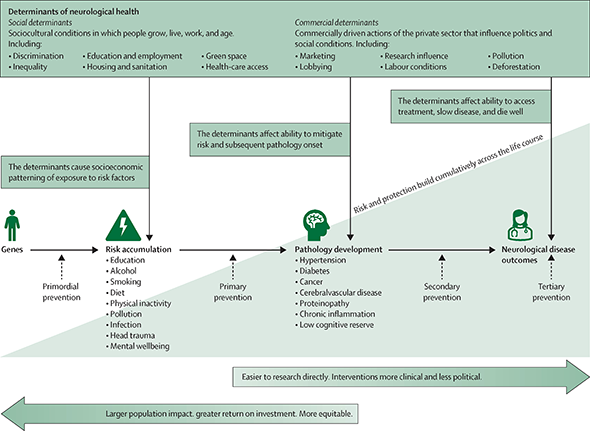
Submitted by Becky Wolfe on Thu, 17/11/2022 - 10:59
A new paper, published to commemorate the 20th anniversary of The Lancet Neurology, highlights the crucial role that social and commercial factors play in influencing neurological health and calls for research to focus on these upstream determinants of health.
The paper provides an overview of neurological research and trends in neurological disorders since the journal was launched 20 years ago. It shows how research, driven by innovations in technologies, has increasingly taken a clinical and biomedical approach - focusing on treating a single patient at a time for a single neurological disorder.
At the same time, the number of people of people suffering or dying from neurological disorders has increased, especially in low-and middle-income countries due to increases in life expectancy and rising prevalence of risk factors such as obesity, hyperglycaemia (high blood sugar), and smoking.
Upstream determinants of health
The paper draws on several examples to demonstrate how the conditions in which people are born, grow, work, live and age – the social and commercial determinants of health - affect not only a person’s risk of neurological disease, but also their ability to reduce complications from their illness and live well with disease. In England, for example, the median age at first stroke is 7 years younger in the most deprived areas than in the least.
Commercial determinants of health – the influence of the private sector on the health of populations through advertising, government lobbying and other channels – also influence neurological health, and often reinforce inequalities caused by social determinants.
Figure showing the social and commercial determinants of neurological health (click to view large image)
The need for a paradigm shift in neurological research 
The authors conclude by setting out a challenge to clinicians, researchers, publishers and funders to correct the imbalance between the current direction of travel of neurological research and the scale of impact of social and commercial determinants of neurological health. This can be achieved by grounding neurological research in public health and epidemiology principles, with greater focus on reducing inequalities and relevance to the populations it aims to serve.
Read the full article, co-authored by our co-director, Carol Brayne.


